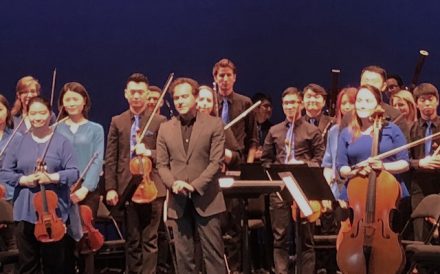The Orchestra Now (TON)
Hudson Hall
Hudson, N.Y.
Sunday, March 18, 2018
Review by Seth Rogovoy
(HUDSON, N.Y.) – Conductor James Bagwell and The Orchestra Now (TON) brought what as far as anyone knows was the first orchestral performance ever to Hudson Hall, formerly known as the Hudson Opera House, on Sunday afternoon, in an adventurous program that showcased the youthful vibrancy of the pre-professional orchestra and Bagwell’s curatorial ingenuity.
Both Bagwell, who lives just down the street in Hudson, and the orchestra, based at Bard College, were forceful and adept at tackling a dizzyingly diverse program featuring wildly different works by French 19th-century composer Georges Bizet, mid-20th-century American composer Virgil Thomson, and modern Estonian composer Arvo Pärt.
The concert kicked off with Pärt’s 1977 piece “Fratres,” one of his early, triad-based “tintinnabulation” works. The piece was both minimal and Minimalist, with a quartet of cellos and basses laying down a drone atop which the strings played a melody that got rebooted every six bars. Each section was separated by the same percussion phrase that opened the piece, and subsequent melodies evolved in drama and complexity. While the orchestra’s sound was suitably crystalline, the stage was unfortunately not quite large enough to accommodate all the players, and a few drummers were consigned to playing from the wings, thereby muffling their essential role in the composition.
The origin of Virgil Thomson’s “The Plow That Broke the Plains Suite” was both its strength and weakness. The piece began as a film score for a government-funded (can you imagine?) documentary film about the tragedy of the Dust Bowl. In typical Thomson fashion, the suite included a variety of musical styles under the banner of “Americana” – drawing on folksongs, cowboy ballads, church hymns, and jazz. That banner served as the only unifying thread, musically speaking, in what otherwise was a somewhat didactic work – understandably so, given its origins in the service of a work of journalism.
The opening theme/prelude alluded to Martin Luther’s well-known hymn, “A Mighty Fortress Is Our God,” and the fourth movement, “Blues (Speculation),” adopted a Dixieland jazz approach, with rhythmic banjo and muted trumpet. James Bagwell is always a fun, expressive conductor to watch, and I’m damned if I didn’t catch him swinging his hips a bit during this part. Not so fun were the narrative interpolations read by Bagwell; a remnant of the original documentary, the narration was distracting and unnecessary, although it is also possible that the musical movements have so little connection to each other that the narration was needed merely to tie the piece together, such as it did.
Bizet wrote his Symphony in C as a school assignment when he was just 17. And it sounds it. While the work is perfectly proportioned with all the right, classical balances, it’s mostly a symphony-by-numbers – the artist had yet to find his own voice. The young musicians, however, made the most of it: The first movement, Mozartean and bouncy, was played almost like a fanfare; the second movement featured a sinuous oboe solo, redolent of the Caucasus. The third movement seemed oddly and impossibly to connect to the Virgil Thomson work, which was either a stroke of serendipity – a particularly rhythmic cello phrase prefigured a hoedown – or pure genius on the part of Bagwell, if he intended for the connection to be made.
As noted, this was the first orchestral concert to be held in the space, certainly in modern times if not ever. Bagwell and audience members alike paid tribute to room’s acoustics; you don’t really know how an orchestra is going to sound in a space until it plays.
While I agree that the music came across with remarkable clarity – a tribute both to the players as well as the room itself – I did feel that the sound, not the orchestra, lacked resonance. That is to say, what we heard being played onstage was crystal-clear, but the sound itself stayed there. Ideally, a concert hall is more reverberant, and a true concert stage is constructed to amplify the music forward into and around the audience. So without nitpicking nor hyping, let’s say that for acoustic, unamplified music being played on a proscenium stage, the sound was indeed remarkable.
Also remarkable was the simple fact that this concert was taking place when and where it was: on a Sunday winter’s afternoon in downtown Hudson, before a standing-room-only crowd. For that alone we can be grateful, and we are.


1 comment for “(Concert Review) The Orchestra Now (TON), Hudson [N.Y.] Hall, Mar 18, 2018”